This article is written and published in April of 2022. We plan to come back to this topic regularly, updating it at least once a year.
Search Engine Optimization is a weighty part of any marketing strategy. While there are enough materials about SEO for B2C to guide you, for a B2B project things might get a little more complex. Even more so – if you are working in China. B2B users are known to display different search habits, B2B websites are built around slightly different principles. As for SEO, there are differences between SEO for Chinese search engines and for Google.
In this article we discuss details of SEO strategy for a B2B business in China. We’ll start with some general B2B SEO principles and work our way to the practical implementation of search engine optimization. Note that we are talking about B2B in general, we are also planning to publish articles on SEO for B2B eCommerce in the near future.
Difference between B2C and B2B SEO
By saying B2B SEO we don’t mean there is a particular set of rules that Google (or any other search engine) apply to B2B websites. Everything you know about best SEO practices – great content, well-executed keyword research, proper on-page optimization and fast page loading speed – all those are the best practices for B2B too. However, there is an important difference in how users search when they are looking for B2B products and services.
Different search volume
While B2C target audiences tend to be rather wide chunks of population, the situation is quite different when you are in B2B. When your product is specific industrial equipment - your market is the factories who use that equipment, and the list of them can be quite short.
As a result, B2B-related searches are orders of magnitude smaller in volume than in most B2C searches. It will affect all aspects of your SEO strategy – from the way you do keyword research to how you track your results.
Lower visit-to-lead conversion rates
Generally, B2B pages have lower visit-to-lead conversion rates, compared to most B2C counterparts. It can take much longer for an average B2B customer to be convinced to leave their contact details, and it takes a bigger effort to do so. This gets even more pronounced as the cost of the goods or service goes up.
To build a successful SEO strategy, you need to be aware of how your SEO results affect the number of leads and sales – and how to mitigate low numbers of search volume and conversion. A popular approach that can somewhat mitigate the hardships of lower volumes and conversion rate is the use of “Search Keyword funnel”. This tool can be used anywhere, but in B2B it will become the critical piece of your strategy.
Search Keywords funnel
Search Keywords funnel is an approach in which you break down the process of getting the client into phases: from broad informational requests about a problem they have and ending with the sales-related searches leading right to your products and services.
Then you perform semantic analysis and keyword research for all of the stages. For example, if your most converting keyword at the bottom of the funnel is “buy heavy duty industrial generator”, you also would want to look into informational requests preceding that – “how to choose a generator” or “best industrial generators”. You may want to expand even further into customers' initial research and self-education “how generators work” or “what generators are for”.
On the higher stage the funnel requests will be more abstract and distant from your product, but the search volume is much bigger. If you manage to attract attention at the general research stage, show your expertise at the “search for detailed information” stage, by the time they actually buy the product, the users are ready to become your loyal customers.
Required level of expertise
In B2B the level of required expertise is going to be much higher than in average B2C business. The B2B audience is often making crucial commitments, they dedicate significant time and effort to find what they need. There are dedicated roles, such as procurement managers, solely created to make sure the company picks the best possible suppliers and gets the best deals.
From the SEO perspective it means particular importance of the quality and authority of the content. The content needs to be produced from the position of deep industry knowledge and expertise, so outsourcing it will probably no longer be a valid option.
To put it all together, B2B SEO is essentially SEO on “hard difficulty” – you are competing for fewer customers who are much more picky and discerning in their choices.
SEO landscape in China: search engines
Baidu
Baidu is the biggest search engine on the Chinese market. There are various estimates putting Baidu’ market share at 60 to 80 percent. Its positions are particularly strong in the mobile search segment, where it surpasses the 90% mark.
Baidu developed a huge ecosystem of services besides just search – map, news, encyclopedia and dozens of other services, covering most of the digital needs of Chinese netizens.
Sogou
Sogou, subsidiary of Tencent, is a strong contender to Baidu’s leadership, especially when it comes to desktop. By various estimates, it holds 30 to 60 percent of the desktop search, which makes it either a close second or even the market leader in this segment.
There are multiple factors, adding to Sogou’s success. Merging with Soso, another popular search engine. Sogou has been a default engine for QQ, the second biggest website in China, which added to the search engine’s success. Sogou was behind Sogou Pinyin - one of the competing software for inputting Chinese characters, something that every Chinese user has. It also partners with Zhihu, a Chinese version of Quora, a popular Question and Answer platform in China.
Shenma
Relative newcomer, founded in 2014, Shenma is vying for the third place on the market. It is backed by eCommerce giant AliBaba and by UCWeb, a developer of popular in China UC Browser. Shenma is estimated to have 3 to 8 percent of the market, most of its presence is in mobile search.
Others
Here are some other search engines worth mentioning:
Haosou (also known as so.com) is a product of QiHoo 360, a company behind another popular Chinese browser, “360 Browser”. 360 browser is pre-installed on most Chinese computers and claims to be more secure than Baidu and others.
Youdao is a product of Chinese game development company NetEase, and it has particularly strong performance in the area of entertaining content - music, videos, blogs, both in Chinese and English.
Bing is the only one non-Chinese originated search engine that managed to achieve notable results in China. After Google was blocked, Bing became a popular tool to use among expats who for whatever reasons decided to stay within the limits of the Great Firewall.
Picking the search engine to focus on will largely depend on the searching habits of your target audience. In the case of B2B you can probably focus on the top two – Baidu and Sogou to maximize the results of your efforts. Now let's have a look at some particular aspects of SEO in China.
SERP
Let’s have a quick look at what Baidu’s SERP (search Engine result page) looks like. First several positions will probably be taken by paid search results, followed by results from Baidu-backed sites such as Baidu Baike, the online encyclopedia. In some extreme cases, true organic can start as low as two thirds of the way down the SERP.
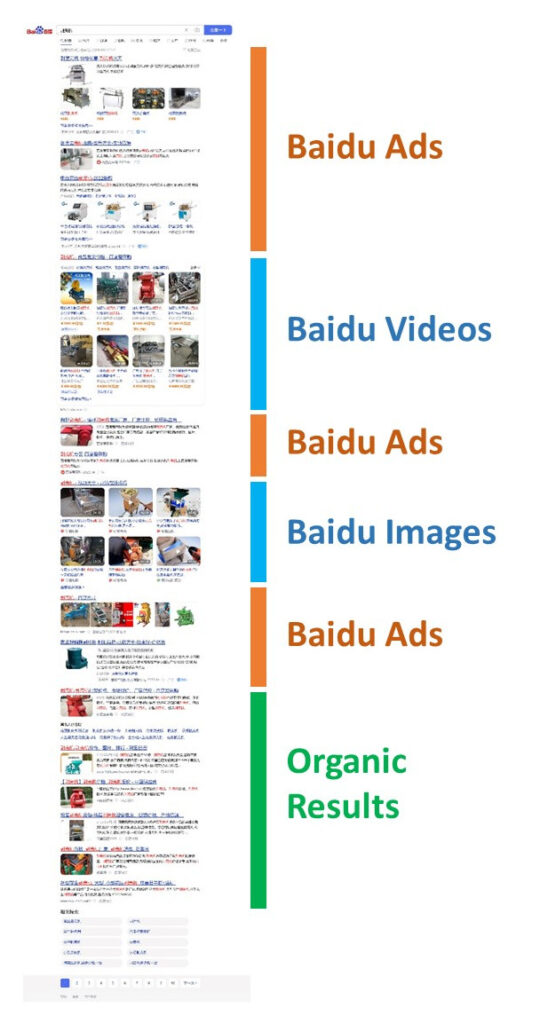
Example of Baidu SERP, heavy with non-organic results
What it means for SEO – higher competition, especially for popular search keywords. If even your best effort would place you in the second half of the results, your SEO will have to be several times better just to get similar results you’d get in Google. Trying to get into the SERP through images and video can be a good idea too. Alternatively, it might be a good signal to start looking into Baidu’s context advertising – but this is the topic for a completely different article.
Domain / Language / Hosting
Domain
There is a popular conception that successful SEO in China can only be achieved for .CN domains. This is not quite true – to see that, just look at the list of most popular Chinese websites – there is only one .CN in the top ten. Having said that, there are a few caveats:
If other “international” domains, like .edu or .net also can work just fine, the same cannot be said for any other countries' domains (.co.uk, .au, .de etc). These will not work.
Think about the psychological effect you want to achieve: .com is generally associated with international brands while .cn with something local or localized.
If you have a multi-language, multi-location .com site where each country gets its subdomain or folder – this is not going to work for Chinese SEO. Let’s talk about it in a little more detail.
Language
All top Chinese search engines consider themselves “Chinese language” search engines, so content in other languages will be ignored. This is why if you are looking at localization of your current website, just adding a subdomain of the folder is not a good solution. You have to build a separate Chinese-language only website to have any chance of SEO success.
Hosting
Finally, to have good rankings in Baidu or Sogou, you need your website to be hosted in mainland China. Speed is a very important factor in Baidu ranking and hosting the website anywhere outside of the mainland will have a massive negative effect on your website’s loading speed.
ICP BeiAn
Any website in China has to go through the authorization procedure. As a result of the authorisation, you will receive a registration certificate, also known as BeiAn. You have to display it on all of your website’s public pages, having BeiAn is a prerequisite of being ranked by Baidu or Sogou.
Getting and using your ICP BeiAn certification may be a little intimidating for the first time, so please use the more detailed Entering China Ecommerce: ICP Beian Must-knows in 2017This article will offer you a high level understanding of ICP Beian, especially for a foreign brand/business aiming to gain presence on China eCommerce.manual we published on our website previously.
Keyword research
One of the first things to do in any SEO campaign is define what are the keywords we are trying to get the ranking for. It is particularly important in the case of Chinese Engines.
Several years ago Google implemented a technology called a semantic search algorithm, that allows you to look beyond keywords, trying to understand the meaning of the request. This adds flexibility to the use of keywords, dilutes their importance, making “great content” crucial for SEO success.
Baidu or Sogou use a more keyword oriented approach. In order to get great SEO results, you will have to identify keywords that will bring you the most traffic, and strictly focus on having those keywords in all the crucial places of your content.
Getting the data
The best place to get your keyword data is Baidu’s paid search account. Baidu has its own version of Keyword planner – providing valuable statistics about keywords, related searches, search volumes and so on. It is quite generous with the data, offering actual, not rounded up numbers and providing mobile-desktop breakdown.
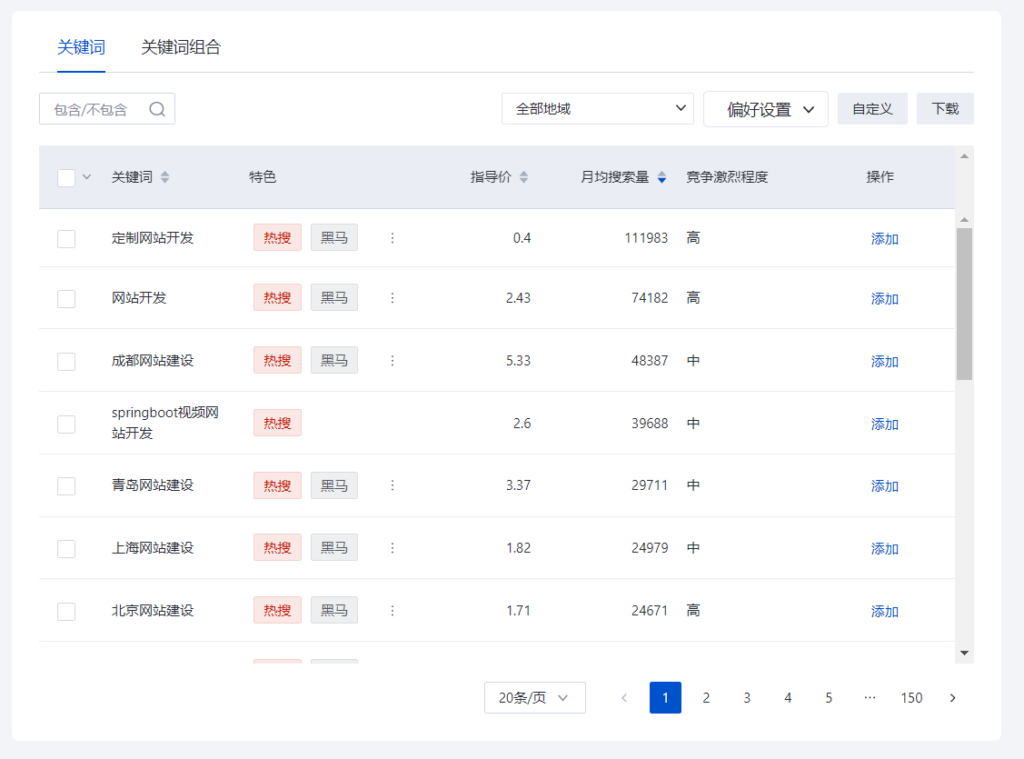
Example of Baidu Ads’ Keyword tool output: apart from the search volume it provides estimated click cost for PPC and competition level.
Competition research
SEO is what is called a “zero-sum game”. There are only so many users, searching for your focus keywords – and it is either you or your competitor who is going to get them. One of the greatest sources of ideas for your SEO strategy can and should be websites who also are vying for the same audience – especially if they are already on the top.
Websites that are already leading, must have done something right. Visit and browse through them carefully, here are just a few things to be on a lookout for:
- General look and feel of the website. Tone, design, attitude.
- The way navigation is organized. What sections do the website have, what terms are used to guide users
- Content topics for blog pages and for main website pages.
- Terms and keywords used to describe their products and services.
- Look at the source code of the website: what keywords have they picked, what technology was used.
Meta data
Title
Baidu places much importance on CTR of the search results, so having an enticing title is important. Acceptable title length, due to the nature of Chinese characters, is around 30-32 characters. Make sure your target keywords, at least one of them, are included.
Meta Description
While Google says it does not look at the content of Meta Description, there is no information like that about Baidu. Make sure you have 1-2 high-frequency keywords included, but keep it interesting and relevant for good CTR.
Your Meta Description will be cut off at 75 characters (Google accepts 160), so make sure yours is within those limits.
Meta Keywords
It is a well-known fact that Google retired Meta Keywords more than a decade ago. Most SEO software retired their support for this meta field too. In China however, it does not seem to be the case.
While Baidu has no official notice about Keywords – one way or another – most (and often, all) top websites have Keywords fields present on the page, and populated with related content.
Technical factors
JS rendering / page size
Javascript is a great modern technology that allows users a few features that make browsing experience really smooth: extremely fast content update, browsing without page reload, complex interactions with the website.
Baidu and Sogou, however, do not support Javascript-generated websites, at least at the moment. If you absolutely have to use JS, consider pre-rendering technologies that run all necessary JS code on the server and provide users with generated HTML.
Overall, your page should have a minimal amount of code – there are sources that suggest Baidu prefers “mean and lean” pages, some proposing there is a cap on how big the page’s code can be.
Other factors
There are a lot of SEO factors that are similar between Baidu and Google.
Things like page loading speed, content freshness, authoritative external links – all that would have a positive impact on your SEO results.
External factors, like inbound links, are getting less and less important for Google, but still carry quite a lot of weight for Baidu.
Tracking the results
Google Analytics
While Google Analytics itself is blocked in mainland China, Google Analytics’ tracking code snippet works just fine. You can use it on your website to get the results into GA.
Baidu Tongji (Baidu analytics)
Baidu has its own analytical solution – Baidu Tongji. Its Chinese-only interface can be a little intimidating if you don't speak the language, but other than that it is a solid alternative to GA. It even has features that Google never had even probably never will (because of the privacy concerns) – a list of all if your visitors, with all their browser, OS resolution information, browsing history and the IP address.
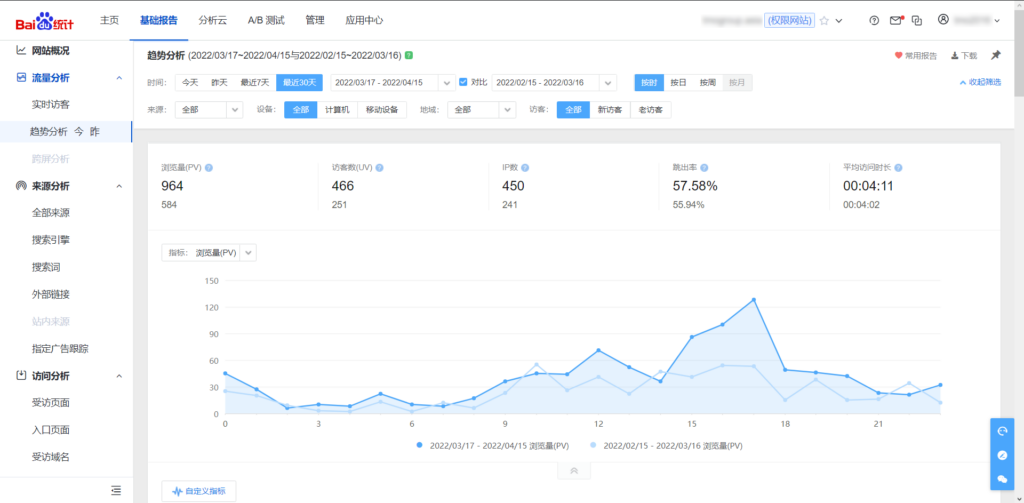
One of the Baidu Tongji’s reports
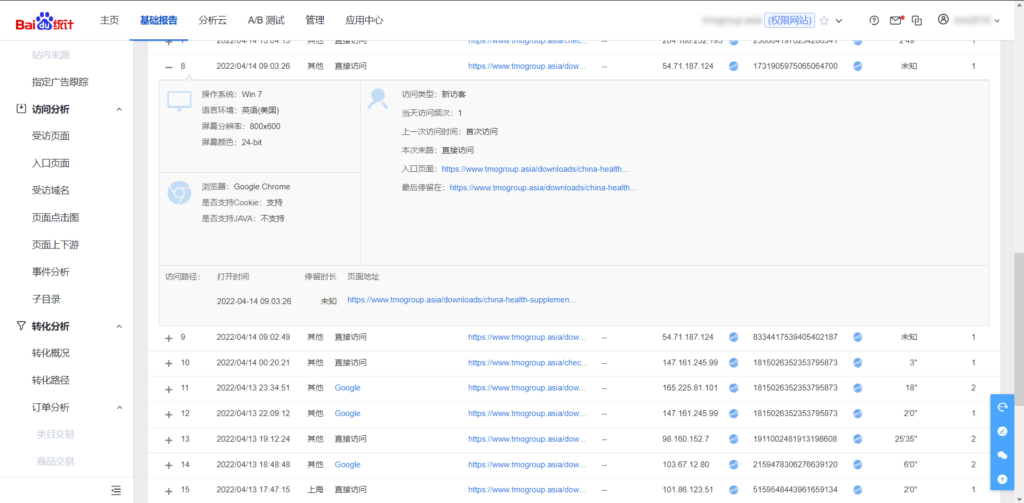
Individual Visitor’s information in Baidu Tongji
Baidu Ziyuan (Baidu webmaster)
If using GA can make Baidu Tongji redundant, there is no replacement for Baidu Ziyuan, Baidu Webmaster tool.
Similar to its Google counterpart (Google Webmaster a.k.a. Search Console), it can provide you with valuable information about indexing and search appearance. All the interface is only in Chinese, but half an hour with an online translator will make you an expert of this particular part of Chinese language.
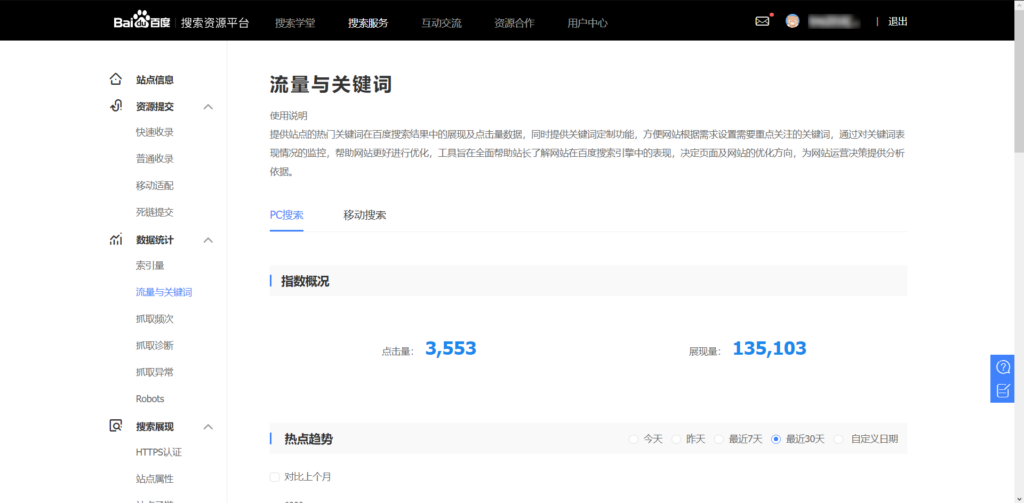
One of the reports of Baidu Ziyuan
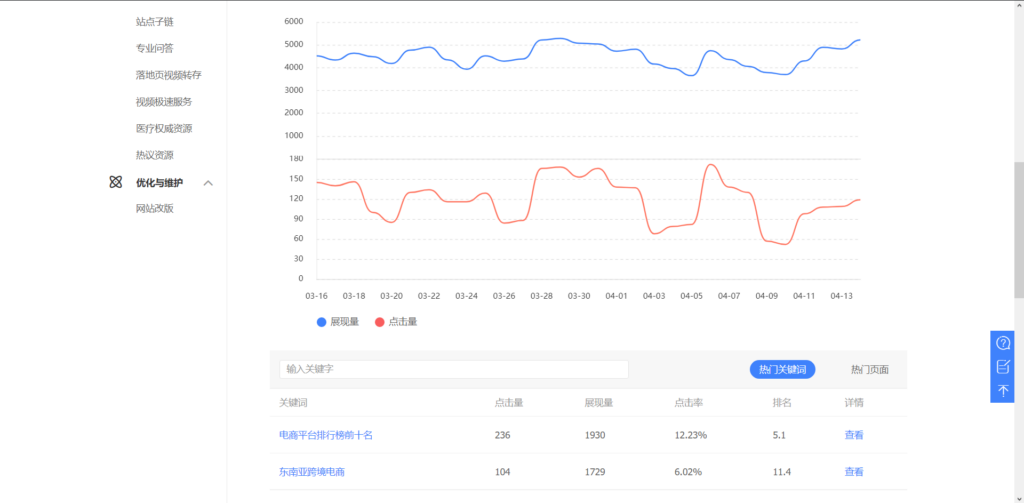
Baidu Ziyuan’s Search performance report. Results are limited by 30 days, but number of rows are not limited
To put it all together, implementing a SEO strategy for a B2B website in China – will truly test your SEO skills. B2B is a little bit more challenging to do SEO to begin with, but doing it in Chinese puts an extra twist on it.
Baidu and Sogou are very reliant on things like keywords, meta description, sensitive to bloated page size and sloppily made websites. You need to remain on top of your SEO game, you need to take care of those factors, all the while producing fresh and relevant content.
If you enjoyed reading this article, you most probably will be interested in “Guide to B2B in China”, a 90-page comprehensive overview of all major aspects – from setting up your price and payment strategies to figuring out your digital assets and logistics. The guide will be available on our website shortly.
We would be happy to continue the discussion of how to get to success on the Chinese SEO scene. Let us know about your project and how we can help you, by leaving us a note through our Contact Us page. We hope to be a part of your successful journey to the top of the Chinese search ecosystem.














